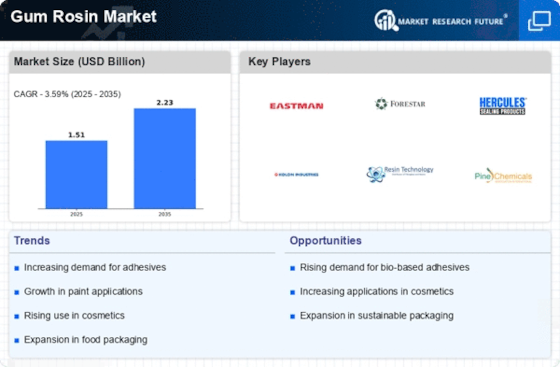Market Share
Gum Rosin Market Share Analysis
In countries like Brazil and Argentina, private investors either buy or lease land to grow densely packed plantation forests. Skilled workers, known as "tappers," are hired directly or through tapping businesses to collect oleoresin. This agricultural approach guides how forests are managed and tapping methods are organized. The tappers work for companies that maintain pine tree plantations, where they have access to modern equipment and receive fair pay. The use of advanced molecular pine tree genetics and chemical stimulants by PCI (Pine Chemical Industry) has increased oleoresin production in pine trees. With research and development (R&D), a single worker can now tap 7,000-10,000 trees annually, a significant increase from the previous 1,500-2,000 trees using standard PCI techniques. In a commercial setting, a single tapper can tap four to six times more trees compared to a natural forest in the same time frame. Additionally, the average oleoresin yield from tapping trees in a plantation forest is nearly three times that of a natural forest. Advances in forestry management, tapping technology, molecular genetics research, and hybrid pine tree development contribute to increased oleoresin production and value. This has led to a notable shift in the PCI business model, with businesses collaborating with academic institutions and trade associations to enhance the economic value and production of pine forests. The role of a pine tapper and the required skills are evolving.
African countries have the potential to produce naval gum stores by utilizing large areas of underutilized pine trees. Some indications suggest that this potential is being realized in certain cases. Malawi, for instance, has over 50,000 hectares of mature pines in the north, with potential viability for commercial tapping, especially with P. elliottii. However, the country may not become a major international producer of naval stores. In Uganda, tapping operations for P. caribaea have started on a small scale. Other countries like Tanzania and Zambia possess significant pine forests, but their suitability and capacity for naval gum store production are yet to be proven. South Africa focuses its tapping operations on extensive plantings of P. elliottii and P. caribaea in northern Natal's Lake St Lucia area. The resulting rosin and turpentine are mostly consumed in the United States. P. elliottii grown in the Machakos area of southern Kenya is used to produce gum rosin, with total resin production showing a slight increase. All rosins are modified and sold to local paper mills for use as sizing agents.
Moreover, industries using gum rosin, such as adhesives and sealants, rubber, paints & coatings, and food & beverages, are growing in the region. For example, the South African government allocated USD 51.7 Billion in the 2022 budget for infrastructure development, potentially driving demand for construction materials and boosting the gum rosin market in the forecast period. Similarly, in the Middle East, the growth in end-use industries, infrastructure development, and the rubber industry pose an opportunity for manufacturers to expand in the developing regions of Latin America, the Middle East, and South Africa.


















Leave a Comment